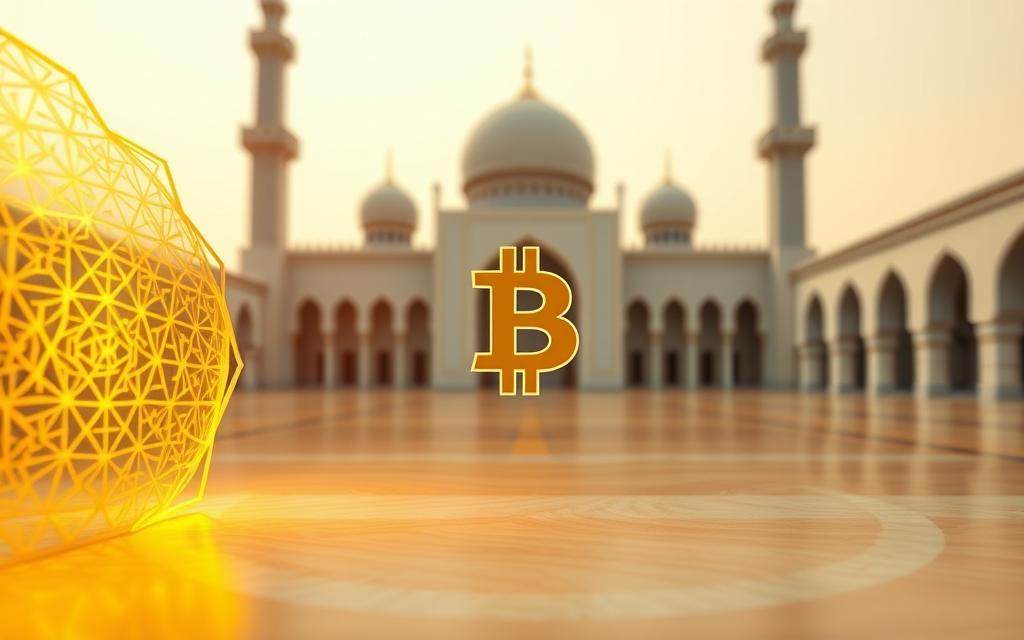Table of Contents
The growing adoption of cryptocurrency has raised important questions about its permissibility under Islamic law. With an estimated 1.8 billion Muslims worldwide, the need for clarity on whether digital assets comply with Sharia law is becoming increasingly pressing.
As crypto continues to gain mainstream acceptance, Muslim investors are seeking guidance on whether their financial activities align with Islamic finance principles, which prohibit interest, excessive uncertainty, and gambling.
The compatibility of cryptocurrency with Islamic law is a complex issue, with various scholarly perspectives on its halal status. This article will explore the intersection of crypto, finance, and Islamic principles, examining the value and transactions involved.
Understanding Cryptocurrency in the Modern Financial Landscape
The modern financial landscape is witnessing a transformative shift with the advent of cryptocurrency and its underlying blockchain technology. This change is driven by the need for more secure, transparent, and efficient financial systems.
What is Cryptocurrency and Blockchain Technology?
Cryptocurrency is a digital or virtual currency that uses cryptography for security, making it difficult to counterfeit or manipulate. Blockchain technology is the foundational infrastructure that enables cryptocurrencies to function without central authorities. It is a distributed ledger system that ensures transparency and immutability of transactions. The decentralization of blockchain enhances user control and security, reducing the risk of fraud and central points of failure.
The use of blockchain technology in cryptocurrency transactions provides a secure and transparent record-keeping system. This technology has far-reaching implications beyond digital currency, with potential applications in various sectors.
Types of Cryptocurrencies and Their Characteristics
There are various types of cryptocurrencies, each with distinct characteristics and use cases. Established coins like Bitcoin and Ethereum are widely recognized, while more speculative assets like meme coins and smaller altcoins offer diverse investment opportunities.
| Cryptocurrency Type | Characteristics | Use Cases |
|---|---|---|
| Bitcoin | First and most widely recognized cryptocurrency, decentralized, and limited supply. | Store of value, medium of exchange. |
| Ethereum | Programmable blockchain with smart contract functionality. | Decentralized applications (dApps), decentralized finance (DeFi). |
| Altcoins/Meme Coins | Alternative cryptocurrencies with varying features and often speculative. | Investment, community-driven projects. |
Cryptocurrencies function as a medium of exchange and potential store of value, comparing their properties to traditional fiat currencies and commodities like gold. The cryptocurrency market is characterized by volatility, with factors such as adoption rates and regulatory changes impacting its dynamics.
Islamic Finance Principles and Their Application to Digital Assets
At the heart of Islamic finance lies a robust set of principles derived from Sharia law, guiding the financial sector towards ethical and responsible practices. These principles are crucial in determining the permissibility of various financial instruments and transactions.
Core Principles of Islamic Finance
The core principles of Islamic finance include the prohibition of Riba (usury or interest), Gharar (excessive uncertainty), and Maysir (gambling). These prohibitions ensure that financial transactions are fair, transparent, and free from exploitative practices. For instance, the prohibition of Riba means that any form of interest or usury is considered haram. Islamic finance emphasizes the importance of compliance with these principles to maintain the integrity of financial transactions.
| Principle | Description |
|---|---|
| Riba | Prohibition of usury or interest |
| Gharar | Avoidance of excessive uncertainty |
| Maysir | Prohibition of gambling |
The Concept of Money in Islamic Jurisprudence
In Islamic jurisprudence, money is considered a medium of exchange and a store of value. The concept of money is closely tied to the principles of Islamic finance, where assets are expected to have intrinsic value or utility. Islamic scholars have historically evaluated traditional forms of money based on these criteria, providing a framework for assessing new digital assets. For more insights on how Islamic principles apply to cryptocurrency, you can refer to this guide on cryptocurrency compliance.
“The money in Islam is not just a medium of exchange but also a measure of value, and it should be used in a way that is just and fair.”
The evaluation of digital assets like cryptocurrencies through the lens of Islamic finance involves examining their compliance with Sharia law, including their potential for interest-free transactions and their asset backing.

Is Bitcoin Halal? Scholarly Perspectives
Islamic scholars have offered diverse perspectives on the legitimacy of Bitcoin and other cryptocurrencies under Islamic law, reflecting the complexity of this issue. The debate surrounding the halal status of Bitcoin is multifaceted, involving considerations of its decentralized nature, potential uses, and compliance with Islamic financial principles.
Arguments Supporting Bitcoin as Halal
Some scholars argue that Bitcoin is halal due to its decentralized nature, which avoids interest-based systems and central authority control. Mufti Muhammad Abu-Bakar, a Sharia advisor, provided a comprehensive analysis in 2018, concluding that Bitcoin is permissible under Islamic principles. He noted that while cryptocurrencies have a speculative element, this does not automatically render them haram, as all currencies carry some level of speculation.
The potential utility of Bitcoin as a medium of exchange and its technological neutrality are also cited as reasons supporting its halal status. Proponents argue that Bitcoin’s characteristics align with certain Islamic financial principles, such as the prohibition of interest (riba) and the emphasis on transparency and fairness.
Arguments Classifying Bitcoin as Haram
Conversely, other scholars classify Bitcoin as haram, citing concerns about excessive speculation and price volatility, which they liken to gambling (maysir). The potential for Bitcoin to be used in illegal activities or money laundering is another argument against its permissibility. Critics argue that these aspects violate Islamic principles that prohibit uncertainty (gharar) and gambling.
The lack of a central authority controlling Bitcoin is seen by some as a drawback, as it potentially facilitates illicit transactions. Moreover, the anonymity associated with cryptocurrency transactions raises concerns about their compliance with Islamic law, which emphasizes transparency and accountability in financial dealings.
Evaluating Cryptocurrencies Through an Islamic Lens
Evaluating cryptocurrencies through the lens of Islamic finance requires a nuanced understanding of both the technology behind digital assets and the principles that govern Sharia compliance. This evaluation is crucial for Muslim investors who are increasingly participating in the cryptocurrency market.
Criteria for Determining Sharia Compliance
To determine if a cryptocurrency is Sharia-compliant, several criteria must be considered. First, the cryptocurrency must have intrinsic value, serving a real-world purpose beyond mere speculation. It should operate with transparency, and its governance structure should be clear and fair. Additionally, it must avoid association with illegal activities or excessive risk.
| Criteria | Description | Sharia Compliance |
|---|---|---|
| Intrinsic Value | The cryptocurrency should have inherent value. | Yes/No |
| Transparency | The cryptocurrency’s operations should be transparent. | Yes/No |
| Governance | The governance structure should be clear and fair. | Yes/No |
Addressing Concerns of Gharar and Maysir
Two significant concerns in Islamic finance are gharar (excessive uncertainty) and maysir (gambling). Cryptocurrency investments can be subject to high volatility, raising concerns about gharar. Moreover, speculative trading in cryptocurrencies may be considered akin to maysir. Muslim investors must carefully assess these risks and ensure their investments are based on sound financial analysis rather than speculation.

By understanding these principles and applying them to cryptocurrency investments, Muslim investors can make informed decisions that align with their financial goals and religious beliefs.
Cryptocurrency Trading and Investment from an Islamic Perspective
The rise of cryptocurrency has led to a surge in trading and investment activities, prompting Islamic scholars to reevaluate these practices through the lens of Sharia law. As the cryptocurrency market continues to evolve, it’s essential to examine how different approaches to trading and investment align with Islamic finance principles.
Short-term Trading vs. Long-term Investment
Short-term trading strategies, such as day trading and scalping, are often viewed as speculative and potentially haram under Islamic law due to their resemblance to gambling. In contrast, long-term investment approaches that focus on the underlying value of cryptocurrencies may be more compatible with Islamic principles, as they encourage a more considered and less speculative approach to the crypto market.

Risk Management Strategies Aligned with Islamic Principles
To manage risk in a manner consistent with Islamic finance, Muslim investors can adopt several strategies. Diversification is key, as it reduces dependence on any single cryptocurrency. Thorough research into the underlying technology and market potential of a cryptocurrency is also crucial. Furthermore, focusing on cryptocurrencies with real-world utility can help align investments with Islamic values that promote beneficial economic activity. By adopting these strategies, investors can navigate the crypto market in a way that is more in line with Islamic principles.
Sharia-Compliant Cryptocurrency Innovations
Sharia-compliant cryptocurrency innovations are gaining traction, providing a bridge between traditional Islamic finance and modern digital assets. This development is crucial as it addresses the concerns raised by Islamic scholars regarding conventional cryptocurrencies.

Examples of Halal Cryptocurrency Projects
Several cryptocurrency projects have emerged with a focus on Sharia compliance. For instance, HelloGold, a gold-backed cryptocurrency from Malaysia, offers a digital asset backed by physical gold, thus providing intrinsic value. Another example is Islamic Coin, which operates on the HAQQ blockchain and has been designed with ethical considerations in mind. These projects demonstrate how cryptocurrency can be structured to align with Islamic principles, such as the requirement for a medium of exchange to have inherent value.
The Role of Blockchain in Islamic Finance
Beyond cryptocurrency, blockchain technology has broader applications in Islamic finance. It can be utilized for smart contracts in Sukuk (Islamic bonds), automated Zakat (charity) distribution, and transparent Waqf (endowment) management. The inherent features of blockchain, such as transparency, immutability, and decentralization, align with Islamic finance principles of fairness and accountability. This technology has the potential to revolutionize various aspects of Islamic financial services, enhancing their efficiency and integrity.
Conclusion: Navigating Cryptocurrency as a Muslim Investor
The intersection of cryptocurrency and Islamic finance presents a dynamic and evolving field that offers both opportunities and challenges for Muslim investors. As the landscape continues to grow, understanding the nuances of digital assets and their compliance with Islamic principles becomes increasingly important.
When evaluating cryptocurrencies, Muslim investors should consider several key factors, including the project’s purpose, underlying technology, governance structure, and potential for real-world utility. This thorough assessment can help determine whether a particular cryptocurrency can be considered halal.
It is crucial for investors to conduct personal research and consult with knowledgeable Islamic scholars when making decisions about cryptocurrency investment. This is an evolving field where perspectives continue to develop, and staying informed is key.
To minimize concerns about gharar (uncertainty) and maysir (gambling), Muslim investors can take practical steps such as focusing on long-term investment rather than short-term speculation, choosing projects with clear utility, and avoiding leverage or margin trading.
As innovation continues and dialogue between technology experts and Islamic scholars progresses, we may see greater clarity and consensus on the permissibility of cryptocurrencies in Islamic finance. This could potentially open new opportunities for Muslim participation in the digital economy while maintaining adherence to religious principles.
FAQ
What are the key factors in determining whether a cryptocurrency is Sharia-compliant?
The key factors include the underlying asset’s intrinsic value, the absence of gharar (uncertainty) and maysir (gambling), and compliance with Islamic finance principles, such as avoiding riba (interest).
How do Islamic scholars view the concept of money in the context of digital assets?
Islamic scholars consider the concept of money in Islamic jurisprudence, which emphasizes the importance of a medium of exchange having intrinsic value or being backed by a tangible asset, when evaluating digital assets.
Can cryptocurrency be considered a form of gharar due to its market volatility?
While market volatility can introduce uncertainty, it is not necessarily considered gharar if the underlying asset has value and the transaction is conducted fairly and transparently.
Are there any Sharia-compliant cryptocurrency projects that adhere to Islamic finance principles?
Yes, there are cryptocurrency projects that incorporate Islamic finance principles, such as avoiding riba and promoting transparency, and these projects are considered more likely to be Sharia-compliant.
How can Muslim investors manage risk when investing in cryptocurrencies?
Muslim investors can manage risk by adopting strategies such as diversification, setting clear investment goals, and avoiding excessive speculation, all of which are aligned with Islamic principles.
What is the role of blockchain technology in promoting transparency and security in cryptocurrency transactions?
Blockchain technology provides a decentralized, immutable ledger that records transactions, promoting transparency and security, and reducing the risk of illicit activities, such as money laundering.
Can cryptocurrency trading be considered a form of maysir if it involves speculative activities?
Cryptocurrency trading that involves excessive speculation can be considered a form of maysir, which is prohibited in Islamic finance, and Muslim investors should be cautious of such activities.
How do Islamic finance principles apply to cryptocurrency investment and trading?
Islamic finance principles, such as avoiding riba and promoting transparency, can be applied to cryptocurrency investment and trading by adopting Sharia-compliant strategies and being mindful of the underlying asset’s value.









